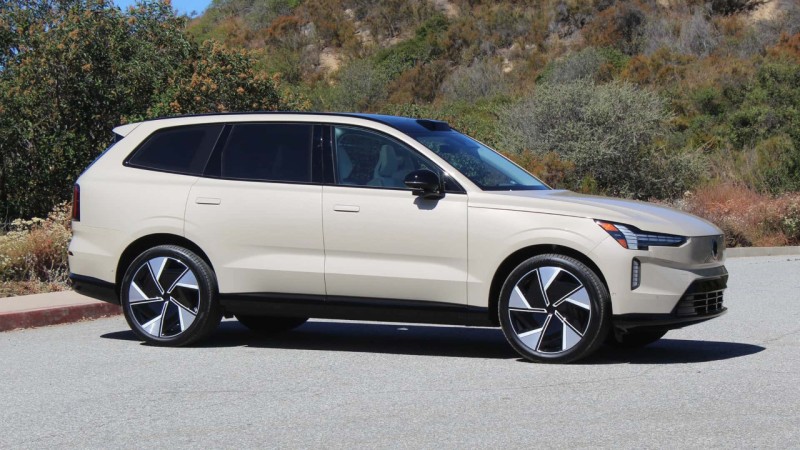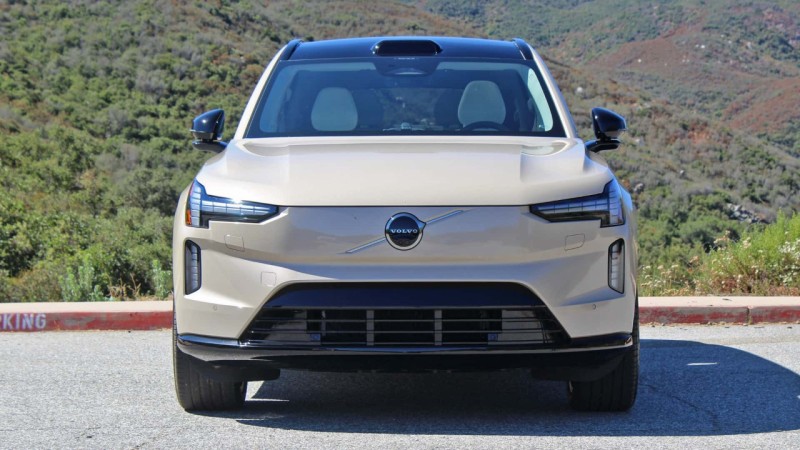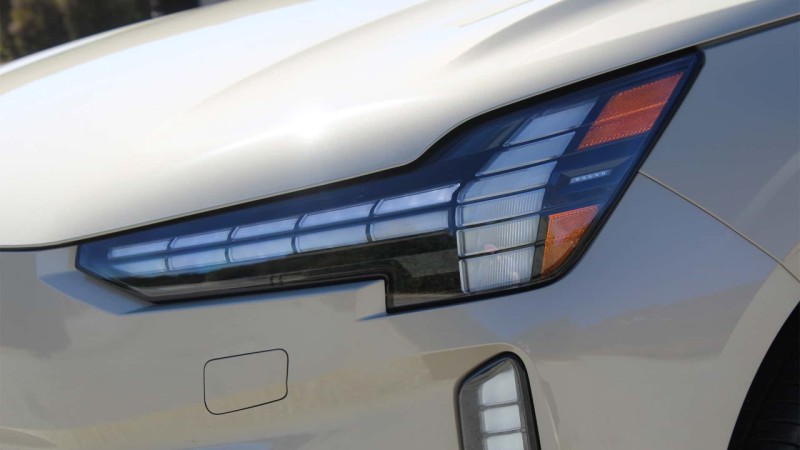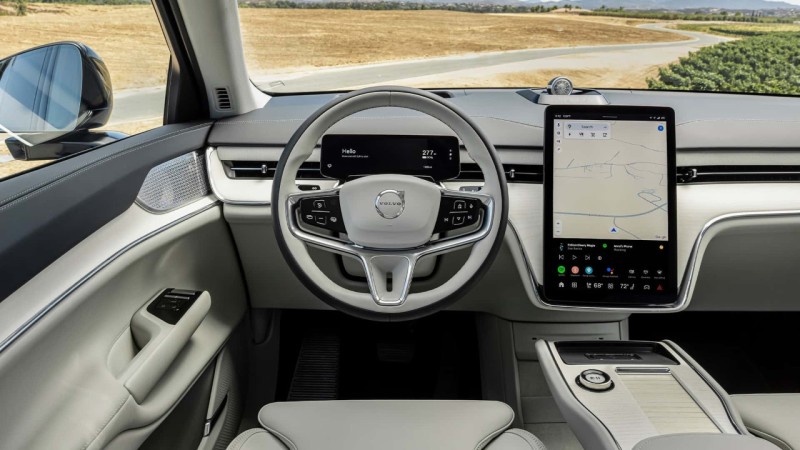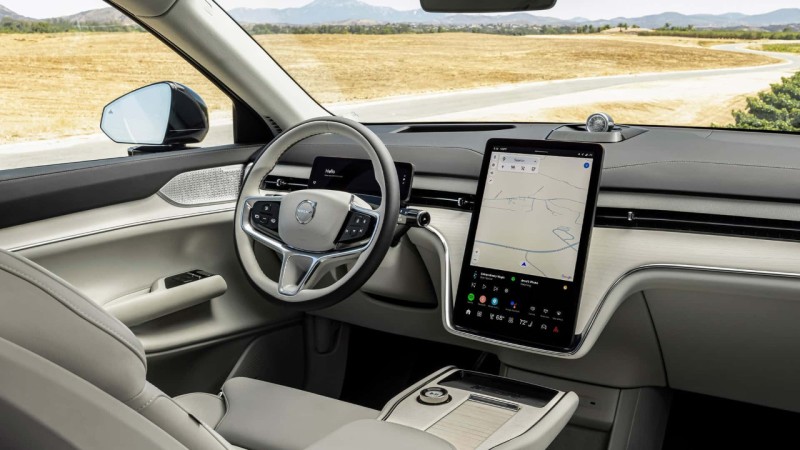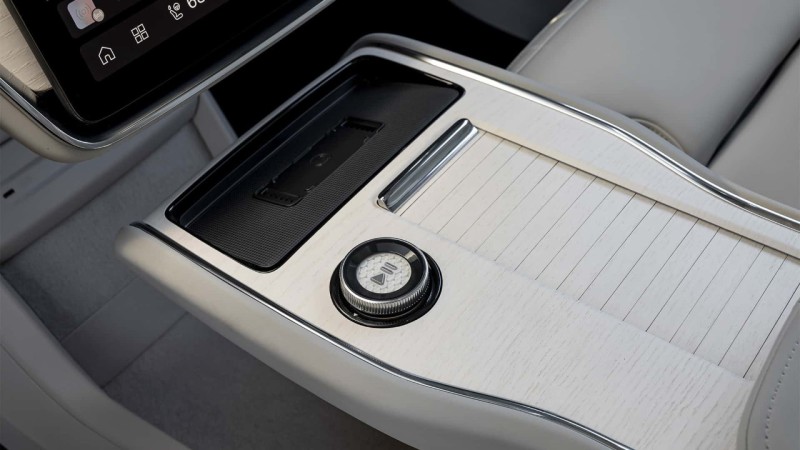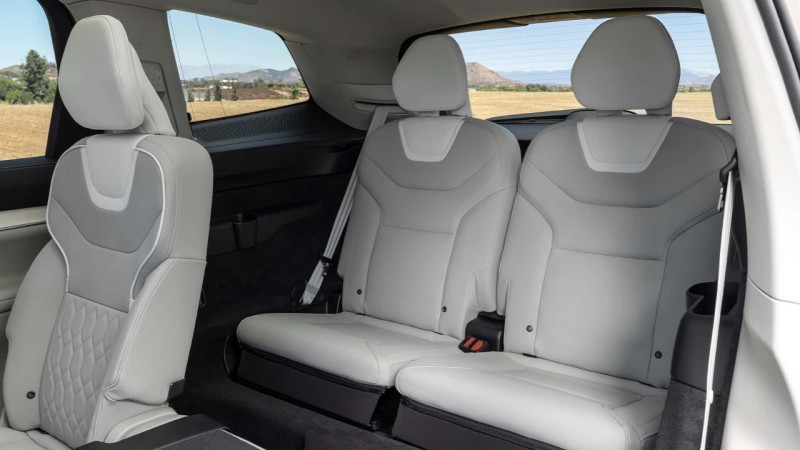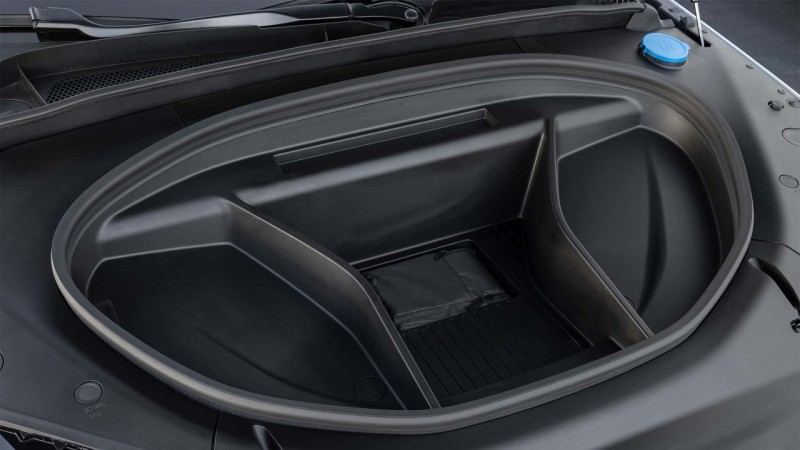The 2025 Volvo EX90 Still Needs Ironing Out
September 16, 2024 260 Volvo
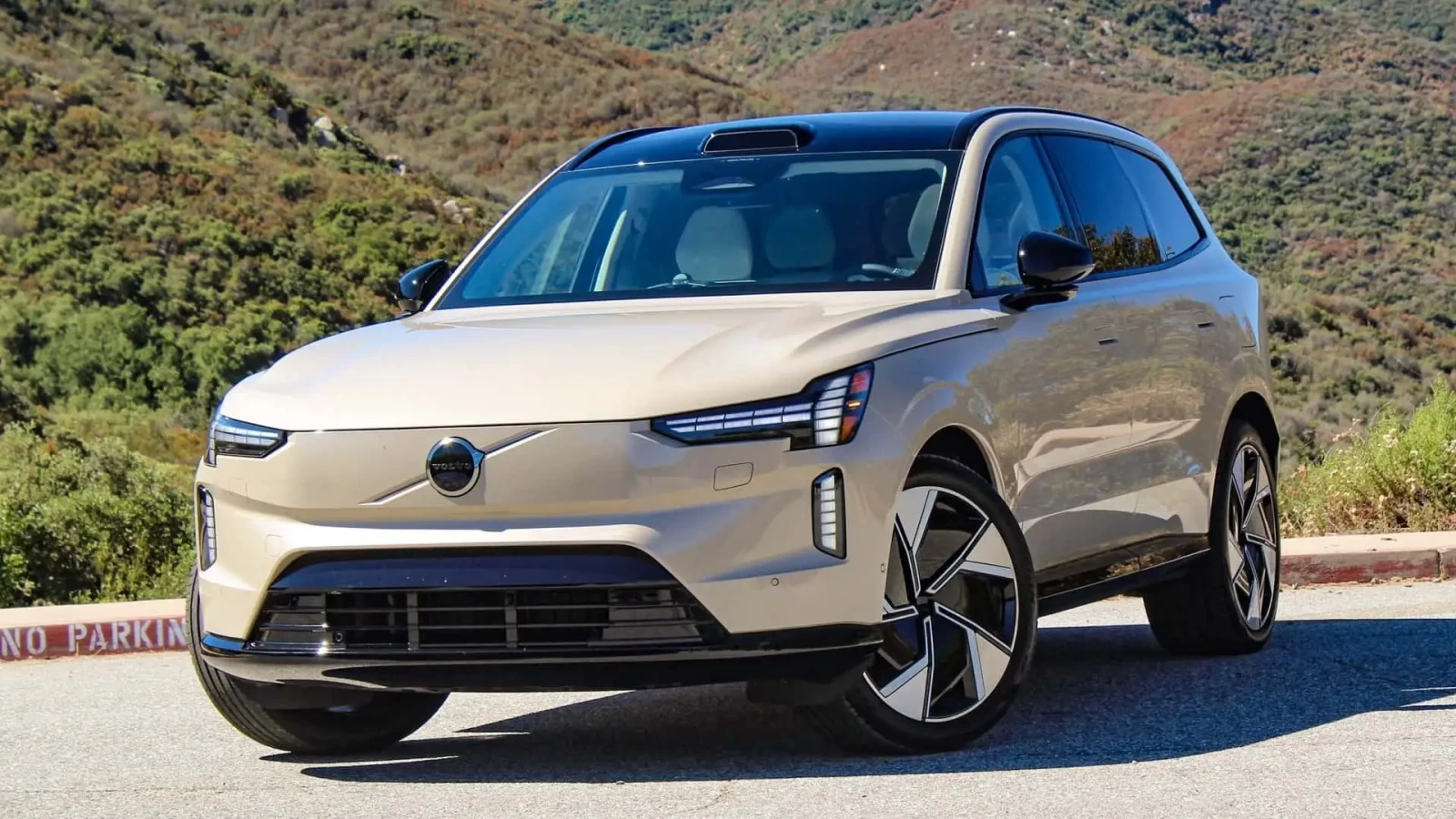
The EX90 has good range, charges quickly, and is serenely quiet. But a lot of stuff doesn’t work.
The Volvo EX90 is the Swedish brand's first electric SUV on a dedicated platform and just one of a handful of electric three-rows on sale in the United States today. Its only real competitors are the Kia EV9, Rivian R1S, and Tesla Model X—three solid machines with lots of range, fast charging, and for the most part, software-enabled features that function well.
The same can't be said of the EX90—at least not yet. Volvo makes lofty promises about assisted driving, convenience, and other software-enabled systems that simply do not function as of writing. Not to mention the number of bugs that should’ve been addressed before I drove the car. Considering Volvo controls the entire software stack, all of these issues should be fixed. I just can’t tell you when.
On paper, at least, the EX90's drivetrain and chassis are impressive. Despite operating in the range of 400 volts, Volvo claims this car's 111.0-kilowatt-hour gross (107.0-kilowatt-hour usable) battery pack can charge at a peak rate of 250 kilowatts. That's faster than the Kia EV9 with its “800-volt” architecture (actually closer to 600 volts in reality), and quicker even than the Rivian.
Despite being one of the brand's early EVs, Volvo uses clever efficiency-boosting tech like a front inverter with Silicon Carbide MOSFETs (the rear uses insulated gate bipolar transistors) that many legacy automakers have yet to adopt in their electric vehicles. It’s one of the big reasons why the EX90 can travel over 300 miles on a charge.
The SiC front inverter likewise translates into impressive straight-line performance. The EX90 sends 402 horsepower and 538 pound-feet of torque to all four wheels. An extra $5,000 for the “Twin Motor Performance” package unlocks 510 hp and 671 lb-ft, but be aware, this is just a software change. The vehicle is capable of these peaks from a hardware perspective, even if you bought the 402-hp version.
Like other big EVs, the EX90 is quick off the line, but it's not fun to drive. The steering is unbelievably numb. Even at higher speeds, there was barely any perceptible connection between the front tires and the wheel itself. Around fast or tight corners, you could hear the tires grasping for grip with a desperate hum.
The EX90's straight-line performance and excellent ride—high-trim EX90s sit on an air suspension—fit nicely with its serene cabin. Most of the glass is laminated for extra silence, and a low drag coefficient of just 0.29 helps, too. Heated and cooled massage seats, as well as an impressive 25-speaker sound system, are the cherry on top.
The EX90’s cabin was a peaceful place to ponder why there were only two switches to manipulate four windows. A third button behind the two switches toggled between the first and second rows. The EX90’s lack of physical switchgear is bewildering. Such a tranquil interior, yet such a superfluous annoyance. It would have been fine if all of that clever software worked properly—but it didn’t.
The pre-production EX90 I drove used a smartphone as a keyfob. Connectivity headaches made it difficult to get the car going again once it had been turned off, and trying to do so once triggered the vehicle’s emergency seatbelt tensioners, which was extremely unpleasant.
Despite an empty rear bench, the EX90 also frequently thought a passenger was in the back seat. Then, suddenly, it thought there were two passengers. More company. The car chimed, insisting I buckle them up.
Perhaps the most bothersome technical bug wasn’t really a bug at all, but the fact that the EX90 has a very prominent Light Detection and Ranging (or, LiDAR) bulge on its roof, which currently does nothing. The system itself is built by a leader in the industry, Luminar, and it’s capable of gathering a mountain of data about the vehicle's surroundings. Many experts believe LiDAR is the key to driverless cars or, in Volvo’s case, ever more safety.
Once again, its lack of functionality comes down to software integration. For context, there’s even a clever washer nozzle at the end of the wiper to clean this sensor, but the sensor itself is not active yet. Frustrating.
Now, Volvo has control of the car’s entire software stack, which the automaker says will make fixing all of these issues and adding functionality much easier. To be completely transparent, I believe it. Many automakers, even non-legacy brands, struggle with software, but eventually, they solve their myriad issues. That said, the statement of, “Please buy this $80,000 car which isn’t done yet,” still makes the EX90 a tough sell.
I’ll say in good faith that Volvo will likely fix all of these issues. I’ll also say in good faith that you should probably just wait until that happens. Eighty grand is the base price for this thing. I just drove a loaded Kia EV9 a few weeks ago that cost $78,430, and despite a few hiccups, it wasn’t waiting on an over-the-air update to get Danny Phantom out of the back seat. It also had switches for every window and physical buttons for things you use often, like climate control.
I’m not a sworn enemy of minimalism—well, okay, maybe I am a little. But regardless of my opinion, the Volvo EX90 takes it too far. You can’t program your way out of that. But because of its underpinnings, the EX90 is a good EV. It has an impressive range and charging performance, and it makes competitors with similar batteries seem outdated in comparison.
I’m not sure if it’s a good car, though. Say what you will about the Cadillac Lyriq; It’s a great car if not a great EV. The former is much more important. The EX90 doesn’t feel like a complete vehicle, and its only real competitors check those boxes. Good cars, good EVs, and for slightly less money.
Until Volvo can get all of the bells ringing and whistles… uhh… whistling, the EX90 has a long way to go.
The Volvo EX90 is the Swedish brand's first electric SUV on a dedicated platform and just one of a handful of electric three-rows on sale in the United States today. Its only real competitors are the Kia EV9, Rivian R1S, and Tesla Model X—three solid machines with lots of range, fast charging, and for the most part, software-enabled features that function well.
The same can't be said of the EX90—at least not yet. Volvo makes lofty promises about assisted driving, convenience, and other software-enabled systems that simply do not function as of writing. Not to mention the number of bugs that should’ve been addressed before I drove the car. Considering Volvo controls the entire software stack, all of these issues should be fixed. I just can’t tell you when.
On paper, at least, the EX90's drivetrain and chassis are impressive. Despite operating in the range of 400 volts, Volvo claims this car's 111.0-kilowatt-hour gross (107.0-kilowatt-hour usable) battery pack can charge at a peak rate of 250 kilowatts. That's faster than the Kia EV9 with its “800-volt” architecture (actually closer to 600 volts in reality), and quicker even than the Rivian.
Despite being one of the brand's early EVs, Volvo uses clever efficiency-boosting tech like a front inverter with Silicon Carbide MOSFETs (the rear uses insulated gate bipolar transistors) that many legacy automakers have yet to adopt in their electric vehicles. It’s one of the big reasons why the EX90 can travel over 300 miles on a charge.
The SiC front inverter likewise translates into impressive straight-line performance. The EX90 sends 402 horsepower and 538 pound-feet of torque to all four wheels. An extra $5,000 for the “Twin Motor Performance” package unlocks 510 hp and 671 lb-ft, but be aware, this is just a software change. The vehicle is capable of these peaks from a hardware perspective, even if you bought the 402-hp version.
Like other big EVs, the EX90 is quick off the line, but it's not fun to drive. The steering is unbelievably numb. Even at higher speeds, there was barely any perceptible connection between the front tires and the wheel itself. Around fast or tight corners, you could hear the tires grasping for grip with a desperate hum.
The EX90's straight-line performance and excellent ride—high-trim EX90s sit on an air suspension—fit nicely with its serene cabin. Most of the glass is laminated for extra silence, and a low drag coefficient of just 0.29 helps, too. Heated and cooled massage seats, as well as an impressive 25-speaker sound system, are the cherry on top.
The EX90’s cabin was a peaceful place to ponder why there were only two switches to manipulate four windows. A third button behind the two switches toggled between the first and second rows. The EX90’s lack of physical switchgear is bewildering. Such a tranquil interior, yet such a superfluous annoyance. It would have been fine if all of that clever software worked properly—but it didn’t.
The pre-production EX90 I drove used a smartphone as a keyfob. Connectivity headaches made it difficult to get the car going again once it had been turned off, and trying to do so once triggered the vehicle’s emergency seatbelt tensioners, which was extremely unpleasant.
Despite an empty rear bench, the EX90 also frequently thought a passenger was in the back seat. Then, suddenly, it thought there were two passengers. More company. The car chimed, insisting I buckle them up.
Perhaps the most bothersome technical bug wasn’t really a bug at all, but the fact that the EX90 has a very prominent Light Detection and Ranging (or, LiDAR) bulge on its roof, which currently does nothing. The system itself is built by a leader in the industry, Luminar, and it’s capable of gathering a mountain of data about the vehicle's surroundings. Many experts believe LiDAR is the key to driverless cars or, in Volvo’s case, ever more safety.
Once again, its lack of functionality comes down to software integration. For context, there’s even a clever washer nozzle at the end of the wiper to clean this sensor, but the sensor itself is not active yet. Frustrating.
Now, Volvo has control of the car’s entire software stack, which the automaker says will make fixing all of these issues and adding functionality much easier. To be completely transparent, I believe it. Many automakers, even non-legacy brands, struggle with software, but eventually, they solve their myriad issues. That said, the statement of, “Please buy this $80,000 car which isn’t done yet,” still makes the EX90 a tough sell.
I’ll say in good faith that Volvo will likely fix all of these issues. I’ll also say in good faith that you should probably just wait until that happens. Eighty grand is the base price for this thing. I just drove a loaded Kia EV9 a few weeks ago that cost $78,430, and despite a few hiccups, it wasn’t waiting on an over-the-air update to get Danny Phantom out of the back seat. It also had switches for every window and physical buttons for things you use often, like climate control.
I’m not a sworn enemy of minimalism—well, okay, maybe I am a little. But regardless of my opinion, the Volvo EX90 takes it too far. You can’t program your way out of that. But because of its underpinnings, the EX90 is a good EV. It has an impressive range and charging performance, and it makes competitors with similar batteries seem outdated in comparison.
I’m not sure if it’s a good car, though. Say what you will about the Cadillac Lyriq; It’s a great car if not a great EV. The former is much more important. The EX90 doesn’t feel like a complete vehicle, and its only real competitors check those boxes. Good cars, good EVs, and for slightly less money.
Until Volvo can get all of the bells ringing and whistles… uhh… whistling, the EX90 has a long way to go.
